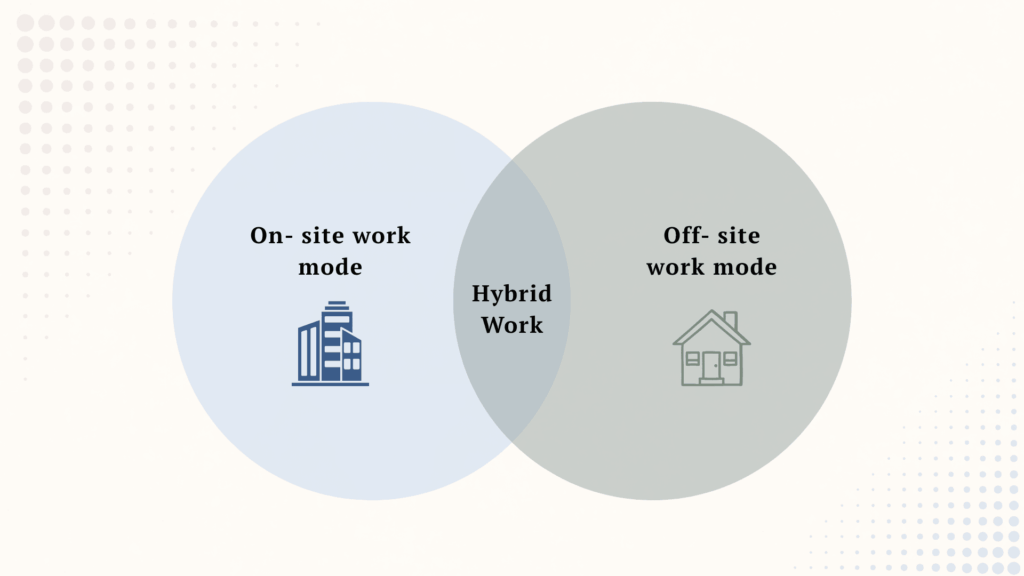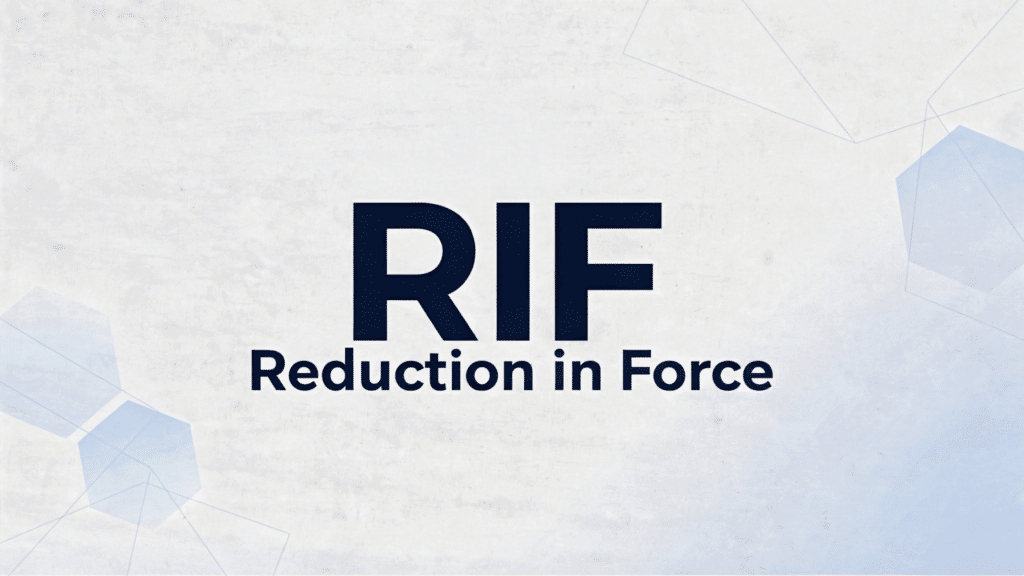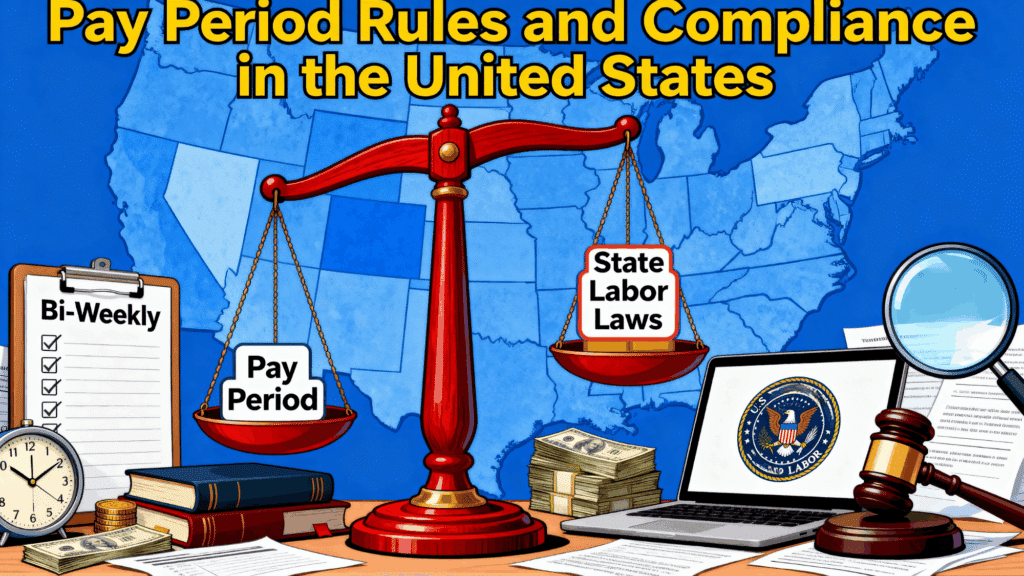Job rejection stings, but smart candidates turn disappointment into opportunity.
Asking for feedback after a job rejection converts setbacks into valuable career insights that most applicants never receive.
You’ll learn the exact steps to request feedback professionally, proven email templates that get responses, and how to handle criticism gracefully.
This covers optimal timing, what to do when employers stay silent, and how to convert rejection into career growth.
Master these strategies to turn every “no” into valuable insights for landing your next opportunity.
When to Request Feedback?
Timing is critical – send your request within 24-48 hours of receiving rejection to ensure your interview remains fresh in the interviewer’s mind.
Choose email over phone calls for feedback requests, as written communication gives hiring managers time to craft thoughtful responses without pressure.
Manage expectations realistically – only 10-30% of feedback requests receive responses due to time constraints, legal concerns, or company policies, so don’t take non-responses personally.
What to Ask:
- Specific areas where your skills or experience could improve
- How was your interview performance perceived
- Suggestions for enhancing your resume or portfolio
- Ways to better align with the role or company culture
- Tips for preparing for similar roles in the future
What Not to Ask for Feedback:
- Why was another candidate selected over you
- Critiques of the company, team, or interview process
- Personal opinions are not related to your professional performance
- Detailed explanations beyond what the hiring manager can reasonably provide
How to Ask for Feedback After an Interview Rejection?
The best way to ask for feedback after an interview rejection is to keep your request short, polite, and focused on learning. Here are a few points to keep in mind:
- Start by thanking the interviewer for their time and consideration
- Acknowledge the outcome respectfully without sounding disappointed
- Express a genuine interest in improving for future opportunities
- Keep your email under 150 words; short and professional
- Ask about areas where you could improve, not why you weren’t chosen
- Give them the option to decline feedback to avoid pressure
- End with gratitude and a positive tone
Below are email templates that you can use for requesting feedback. You can download these templates in PDF format by clicking here. Click here.
Email Template 1: Standard Feedback Request
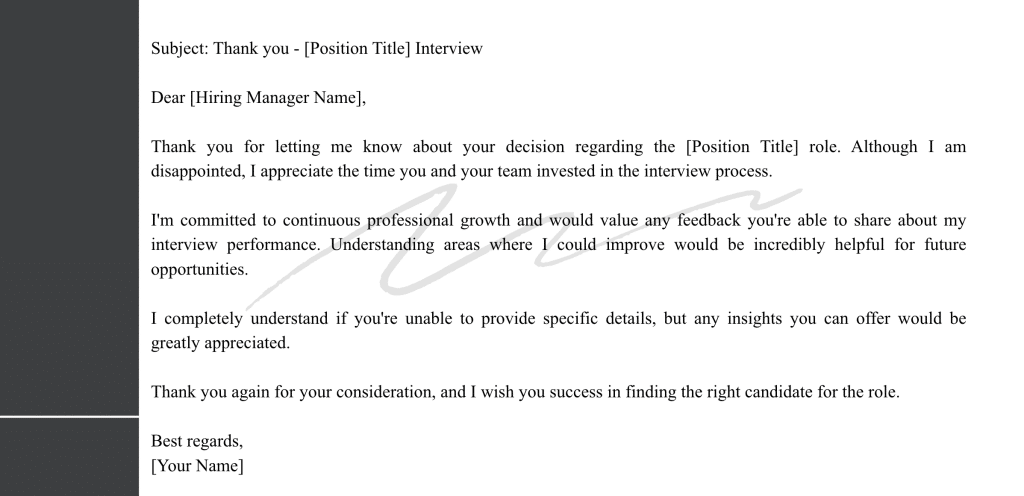
Subject: Thank you – Marketing Coordinator Interview
“Dear Ms. Johnson,
Thank you for letting me know about your decision regarding the Marketing Coordinator role. While disappointed, I appreciate the time you and your team invested in the interview process.
I’m committed to continuous professional growth and would value any feedback you’re able to share about my interview performance. Understanding areas where I could improve would be incredibly helpful for future opportunities.
I completely understand if you’re unable to provide specific details, but any insights you can offer would be greatly appreciated.
Thank you again for your consideration, and I wish you success in finding the right candidate for the role.
Best regards,
Sarah Williams”
Email Template 2: Future Interest + Feedback Request
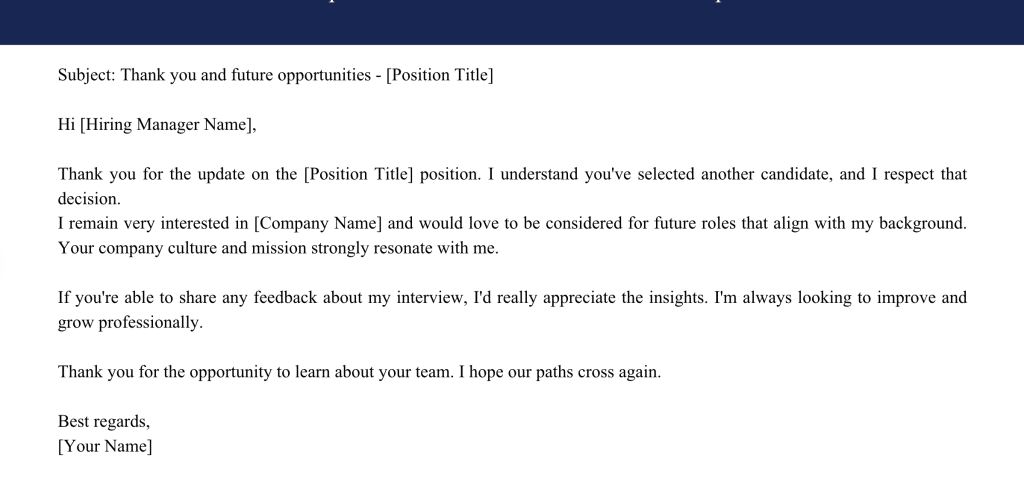
Subject: Thank you and future opportunities – Product Manager
“Hi Mr. Thompson,
Thank you for the update on the Product Manager position. I understand you’ve selected another candidate, and I respect that decision.
I remain very interested in InnovateTech and would love to be considered for future roles that align with my background. Your company culture and mission strongly resonate with me.
If you’re able to share any feedback about my interview, I’d really appreciate the insights. I’m always looking to improve and grow professionally.
Thank you for the opportunity to learn about your team. I hope our paths cross again.
Best regards,
James Patterson”
Why Asking for Feedback Is Important?
Requesting feedback after a job rejection is more than a formality; it’s an opportunity to gain insights that can guide your professional growth, improve your future applications, and help you better align with employer expectations.
Here’s why it matters:
- Identify areas for improvement: Feedback reveals specific skills or behaviors where you fell short.
- Focus your development: Every piece of feedback guides your improvement strategy for future opportunities.
- Demonstrate a growth mindset: Professionally requesting feedback shows you are open to learning and development.
- Leave a positive impression: Handling rejection gracefully keeps you on the hiring manager’s radar and may lead to referrals or future roles.
Handling the Feedback Professionally
When feedback arrives, your response determines whether this experience helps or hurts your professional reputation. Stay positive, regardless of what you hear.
Some feedback might sting, but remember that this insight is a gift most candidates never receive. So, thank them immediately and avoid defensive responses.
Your graceful response to criticism demonstrates emotional intelligence that makes you memorable for future opportunities.
Common feedback areas and solutions:
- Communication skills: Join a proven training program or take presentation courses
- Technical knowledge: Complete online certifications or participate in bootcamps
- Industry experience: Seek volunteer projects or look for freelance opportunities
- Leadership skills: Take on team projects or leadership roles
Conclusion
Asking for feedback after a job rejection changes disappointment into opportunity by building relationships, identifying areas for improvement, and demonstrating professionalism that hiring managers remember.
Request feedback promptly using professional language, remain open to criticism, and respond graciously regardless of the response.
Even when feedback doesn’t arrive, the process shows maturity that sets you apart from other candidates.
Each rejection brings you closer to the right opportunity when you use these moments for growth and learning.
Have you ever asked for feedback after being rejected for a job? Share your experience in the comments below!
Frequently Asked Questions
Should I Mention Specific Interview Moments when Requesting Feedback?
No. Keep requests general. Let them choose what to address rather than directing them to specific topics or moments.
Should I Ask for Feedback from Multiple Interviewers?
Contact your main point of contact only. They can coordinate internally if needed. Multiple requests appear pushy and unprofessional.
Is It Okay to Ask What the Chosen Candidate Had that I Didn’t?
Avoid comparison questions. They put hiring managers in uncomfortable positions and rarely provide useful insights for your growth.





